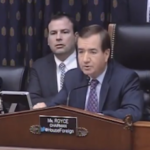BBG Watch
House Foreign Affairs Committee Hearing April 15

“The agency charged with leading the effort – the Broadcasting Board of Governors – has a well-documented history of dysfunction,”, Chairman of the House Foreign Affairs Committee, Rep. Ed Royce (R-CA), said in a statement announcing an April 15 hearing “to examine Russia’s use of media to destabilize Ukraine, Eastern Europe and beyond, and the U.S. government’s inability to respond effectively.”
The hearing, entitled “Confronting Russia’s Weaponization of Information,” will be held on Wednesday, April 15th at 10:00 a.m. in 2172 Rayburn House Office Building.
Wilson Center Discussion April 22
The Wilson Center, chartered by Congress as a research institution, has posted online a new study, “Reassessing U.S. International Broadcasting,” written by a former Broadcasting Board of Governors (BBG) member S. Enders Wimbush and a former Radio Free Europe / Radio Liberty (RFE/RL) executive Elizabeth M. Portale.
The study is highly critical of the current setup and management of U.S. international media outreach under the aegis of the Broadcasting Board of Governors.
Those interviewed for the study included former Secretary of State George P. Shultz, former chairmen of the Broadcasting Board of Governors, Marc Nathanson and Amb. James Glassman, former Voice of America directors Geoffrey Cowan and Robert Reilly, former RFE/RL President Dr. Jeffrey Gedmin, former U.S. Ambassador to Russia Michael McFaul, National Endowment for Democracy President Carl Gershman, former Freedom House President David Kramer, Dr. Francis Fukuyama, and several other prominent American scholars, diplomats, journalists and media experts.
On Wednesday, April 22, there will be a discussion at the Wilson Center in Washington DC on the future mission strategy and organization of U.S. international media outreach.
Senior BBG Official Responds to Study
One senior BBG official was quoted by a source describing the study as a tired rehash of all of the perceived problems and challenges that the BBG faces without any concrete or innovative ideas of how to fix these problems other than “blow it up and start over,” which always sounds great until you have to start deciding what your actually going to build once you destroy what you got. There is no consensus on that, the unnamed official observed.
“The bottom line is everyone agrees that the BBG structure is flawed and it needs a CEO,” a senior BBG official was also quoted as saying, “and most everyone now agrees that influence is more important than reach.” The hard questions are now how the Broadcasting Board of Governors can accomplish this influence from (1) an operational and structural standpoint, (2) a content standpoint, and (3) an access/distribution standpoint, a BBG official who was described as strongly in favor of management reforms at the agency was also quoted by a source as saying in response to the Wimbush-Portale study.
Voice of America Director David Ensor stepping down

Director David Ensor announced that he has submitted his resignation to the Broadcasting Board of Governors (BBG) yesterday and wants to leave by end of May. Well-informed sources told BBG Watch that a permanent replacement for David Ensor is not likely to be named until the federal agency in charge of VOA and other U.S. taxpayer-funded media organizations serving audiences abroad also has a new permanent CEO. First BBG CEO Andy Lack had left earlier this year after only a few weeks on the job.
Among many news and management failures at the Voice of America, President Obama’s recent video statement on the Iran nuclear deal framework announcement was not posted on Facebook and YouTube for hours by VOA English and VOA Persian services.
On Obama’s Iran nuclear deal video statement, Al Jazeera, BBC, Germany’s Deutsche Welle (DW), Russia’s RT news websites and even U.S. State Department public diplomacy websites in English and Persian were getting better audience engagement stats through social media than VOA by a factor of more than 10 to 1, and 20 to 1 in some cases.
The New York Times reported in an article by Ron Nixon that “David Ensor, who as director of the Voice of America has presided over significant growth in the news agency’s audience despite budget cuts, announced Tuesday that he was stepping down.”
More Information on House Foreign Affairs Committee Hearing April 15
 One of the scheduled witnesses at the April 15 House Foreign Affairs Committee hearing, Peter Pomerantsev, has just published an article in The Guardian, “Inside the Kremlin’s hall of mirrors,” discussing how the Kremlin-run Russian media uses fake news stories, doctored photographs, staged TV clips, and armies of paid trolls.
One of the scheduled witnesses at the April 15 House Foreign Affairs Committee hearing, Peter Pomerantsev, has just published an article in The Guardian, “Inside the Kremlin’s hall of mirrors,” discussing how the Kremlin-run Russian media uses fake news stories, doctored photographs, staged TV clips, and armies of paid trolls.
In his article, Peter Pomerantsev summarizes his interview with Rick Stengel, the U.S. Undersecretary of State for Public Diplomacy, “one of those responsible for formulating the American response to Russia’s ambiguous information operations.”
Stengel represents Secretary of State John Kerry at board meetings of the Broadcasting Board of Governors. The Secretary of State is an ex officio member of the bipartisan BBG.
As noted in the House Foreign Affairs Committee press release, during the 113th Congress, Chairman Royce and Ranking Member Engel introduced ‘The U.S. International Communications Reform Act of 2014‘ (H.R. 4490) which passed the House unanimously. H.R. 4490 proposed to overhaul the Broadcasting Board of Governors, create cost savings, and increase agency efficiency. This legislation will be reintroduced in the coming weeks.
###
House Foreign Affairs Committee Press Release
Chairman Royce Announces Hearing on Russia’s ‘Weaponization’ of Information
APR 9, 2015
Hearing to Focus on Russia’s Disinformation Strategy and the U.S. Response
Washington, D.C. – Today, U.S. Rep. Ed Royce (R-CA), Chairman of the House Foreign Affairs Committee, announced the Committee will convene a hearing to examine Russia’s use of media to destabilize Ukraine, Eastern Europe and beyond, and the U.S. government’s inability to respond effectively. The hearing, entitled “Confronting Russia’s Weaponization of Information,” will be held on Wednesday, April 15th at 10:00 a.m. in 2172 Rayburn House Office Building.
Chairman Royce on the hearing: “For years, Putin has used the Russian media to consolidate power at home and divide societies abroad. The strategies employed today by the Kremlin are highly sophisticated and well-funded with an estimated annual budget of more than $600 million. Russia’s media machine has polluted the media environment, the truth is lost, listeners don’t know whom to believe, and fear divides society. Unfortunately, the U.S. has been slow to respond to this challenge and the agency charged with leading the effort – the Broadcasting Board of Governors – has a well-documented history of dysfunction. We need to reform the BBG if we are to have a chance against this ‘weaponization’ of information.”
Note: During the 113th Congress, Chairman Royce and Ranking Member Engel introduced “The U.S. International Communications Reform Act of 2014” (H.R. 4490) which passed the House unanimously. H.R. 4490 proposed to overhaul the Broadcasting Board of Governors, create cost savings, and increase agency efficiency. This legislation will be reintroduced in the coming weeks.
What:
Hearing: “Confronting Russia’s Weaponization of Information”
When:
10:00 a.m. on Wednesday, April 15
Where:
2172 Rayburn House Office Building
Witnesses:
Mr. Peter Pomerantsev
Senior Fellow
The Legatum Institute
Ms. Helle C. Dale
Senior Fellow for Public Diplomacy
The Heritage Foundation
Ms. Elizabeth Wahl
Former RT Anchor
Freelance Journalist/Public Speaker
***See www.foreignaffairs.house.gov for updates.
***Coverage note: All Foreign Affairs Committee proceedings are webcast live atwww.foreignaffairs.house.gov/live-video-feed.
###
###
Background Material
RT Anchor Who Quit
Another witness scheduled to testify at the April 15 House Foreign Affairs Committee hearing is Liz Wahl, a former RT anchor who quit on the air to protest RT’s disinformation campaign over Crimea and Ukraine
ALSO SEE:
Andy Lack on RT
 Former Broadcasting Board of Governors director and CEO Andy Lack made a strong statement about Russia’s propaganda war before he left the agency after only a few weeks in the job, as reported by The New York Times:
Former Broadcasting Board of Governors director and CEO Andy Lack made a strong statement about Russia’s propaganda war before he left the agency after only a few weeks in the job, as reported by The New York Times:
ANDY LACK: “We are facing a number of challenges from entities like Russia Today which is out there pushing a point of view, the Islamic State in the Middle East and groups like Boko Haram, “ he said. “But I firmly believe that this agency has a role to play in facing those challenges.”
State Department Spokesperson Jen Psaki on RT
 Andy Lack’s comment drew a strong condemnation from Russia’s RT. State Department spokesperson Jen Psaki in answering questions posed by an RT correspondent in Washington said that the State Department agrees with “challenges and certainly concerns that I think the new head of BBG was expressing.” She also said: “I think the broad point is the U.S. Government – would the U.S. Government put those three in the same category? No, we wouldn’t.”
Andy Lack’s comment drew a strong condemnation from Russia’s RT. State Department spokesperson Jen Psaki in answering questions posed by an RT correspondent in Washington said that the State Department agrees with “challenges and certainly concerns that I think the new head of BBG was expressing.” She also said: “I think the broad point is the U.S. Government – would the U.S. Government put those three in the same category? No, we wouldn’t.”
Jen Psaki
Spokesperson
Daily Press Briefing
Washington, DC
January 23, 2015QUESTION: The newly appointed chief executive of the BBG said his agency faces a number of, quote-un-quote, challenges – Russia Today, the Islamic State, and Boko Haram – all in one sentence. Would you call those remarks appropriate or inappropriate?
MS. PSAKI: Well, I think, one, let me note that the Broadcasting Board of Governors is an independent federal agency supervising all U.S. Government-supported civilian international media. I’d certainly point you to them for specifics. I think the broad point is the U.S. Government – would the U.S. Government put those three in the same category? No, we wouldn’t. However, there are concerns, I think, that our – we agree with in terms of the fact that the – Russia’s own independent media space is shrinking and the Kremlin continues to apply pressure on the few remaining outlets. And while RT is available to many viewers in the United States – you’re here in the briefing room today – many Russian authorities have curtailed the ability of BBG broadcasters to broadcast there. So those are challenges and certainly concerns that I think the new head of BBG was expressing.
QUESTION: Do you have – just to clarify, do you have any problem with the way he put it?
MS. PSAKI: I think I’d point you to them, and I just stated that wouldn’t be the way that we would state it from here.
QUESTION: How would you state it?
MS. PSAKI: We wouldn’t state it in those terms.
QUESTION: Well, the Secretary of State is a member of the BBG.
MS. PSAKI: Sure. I just stated the concerns we have, which we agree with.
QUESTION: Right.
MS. PSAKI: I would state it in that way.
QUESTION: Okay. So you would not, then, put RT in the same category as Boko Haram and —
MS. PSAKI: That’s what I just said two minutes ago.
QUESTION: Yeah, but you would agree that it is a challenge and —
MS. PSAKI: Correct, I said both of those things.
Stengel and Kerry on RT as a propaganda machine

However, both Secretary of State Kerry and Under Secretary Stengel were not shy earlier in describing RT as the Kremlin’s propaganda and distortion machine.
Richard Stengel, who is a former managing editor of TIME magazine, wrote last April that “RT is a distortion machine, not a news organization.”
RICHARD STENGEL: “…when propaganda poses as news it creates real dangers and gives a green light to violence.
Sometimes it’s even too much for the people paid to make these claims. The network’s clear bias led to an unprecedented on-air rebellion. First, the host of RT America, Abby Martin, condemned Russia’s invasion of Crimea on a broadcast. Then one of the network’s anchors, Liz Wahl, resigned on air, saying, ‘I cannot be part of a network funded by the Russian government that whitewashes the actions of Putin.’
Yet, even so, I would defend the right of RT to broadcast.”
While saying that RT represented a challenge for the Broadcasting Board of Governors, former BBG CEO Andy Lack did not question RT’s right to broadcast, did not call it a terrorist organization, and did not propose that the BBG respond to RT with its own propaganda.
There seems to be a general agreement among most if not all House Foreign Affairs Committee members and Broadcasting Board of Governors members that propaganda is not the answer to RT’s propaganda. There seems to be less consensus on what should be the link, if any, between the BBG, the Voice of America and the U.S. foreign policy establishment. Some Voice of America newsroom correspondents were strongly opposed to the language in H.R. 4490 that VOA should “promote” U.S. foreign policy.
SEE: “Op-Ed Back off, Congress, and keep Voice of America real” by Al Pessin, The Los Angeles Times, June 2, 2014.
The language in the H.R. 4490 was somewhat unclear and contradictory on this issue and is expected to be modified. Neither Democrats nor Republicans in Congress want any administration to use the Voice of America to promote short term foreign policy goals over which there is no national and bipartisan consensus. The new emphasis is likely to be on a media outreach philosophy that is consistent with the long term U.S. foreign policy goals and the 1976 VOA Charter.
RT Called ‘Propaganda Bullhorm’
Last April, Secretary of State John Kerry called RT a “propaganda bullhorn.”
JOHN KERRY: “In fact, the propaganda bullhorn that is the state sponsored Russia Today program has been deployed to promote — actually, Russia Today network, has deployed to promote President Putin’s fantasy about what is playing out on the ground,” he said.
“They almost spend full time devoted to this effort, to propagandize and distort what is happening or not happening in Ukraine.”
As with Andy Lack, RT also demanded an apology from John Kerry, but apparently did not get it.
SEE: ‘Propaganda bullhorn’: John Kerry attacks RT during Ukraine address, RT, April 25, 2014.
Royce Asks Kerry to Support BBG Reform

At a House Foreign Affairs Committee hearing on February 25, 2015, Secretary of State John Kerry testified about the FY 2016 budget request for the State Department and was asked by Chairman Royce to support new legislation to reform the BBG. The FY 2016 budget request for the BBG is $751 million.
Rep. Royce asked Secretary of State John Kerry for the Administration’s “active backing” to again push for reform of the Broadcasting Board of Governors, a federal agency which former Secretary of State Hillary Clinton called “dysfunctional.” Secretaries of State are ex officio members of the bipartisan BBG board.
REP. ED ROYCE (R-CA): “In Eastern Europe, Russia’s military aggression is matched only by the size its propaganda. Russia is spending more than $1.5 billion annually to mislead audiences, sow divisions, and push conspiracy theories out over RT Television. Yet the agency charged with leading our response, the Broadcasting Board of Governors (“BBG”), is – as your predecessor testified to us – dysfunctional. Last Congress, the House passed legislation authored by Ranking Member Engel and me to fix the BBG — the Broadcasting Board of Governors. We hope to have the Administration’s active backing as we again push this reform.”
Secretary Kerry expressed 100% support for Chairman Royce’s efforts to pass legislation this year reforming the Broadcasting Board of Governors, the federal agency in charge of U.S. media outreach abroad, while noting some reservations as to whether the agency should have one or two CEOs. Kerry also asked for more money for the BBG “to confront Russian propaganda” and “to get reform that this troubled agency needs.”
In response to a request from Chairman Royce for assistance from in getting a new version of the Broadcasting Board of Governors reform legislation passed by the U.S. Senate this year “to confront Russian propaganda” and “to get reform that this troubled agency needs,” Secretary Kerry said:
“All I can say, Mr. Chairman, I’m with you 100% on this. I look forward to working with you further. I appreciate your leadership.”
“I’ve had long conversations with our Undersecretary for Public Diplomacy Rick Stengel, who is very seized with some things we need to try to achieve,” Kerry added.
Secretary Kerry pointed out that there is some disagreement as to whether the BBG needs two CEOs, one for the federal part of the agency, which includes the Voice of America, and another one for the non-federal part of the agency composed of surrogate media outlets which are federal grantees. They include Radio Free Europe / Radio Liberty, Radio Free Asia, and Middle East Broadcasting Networks, Inc.
